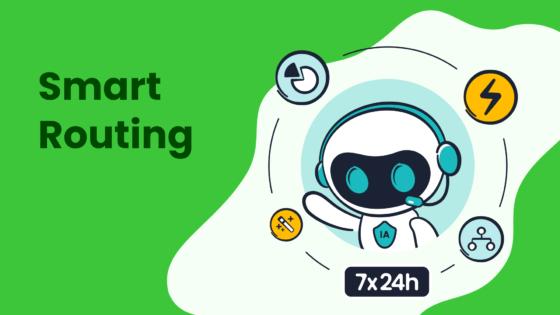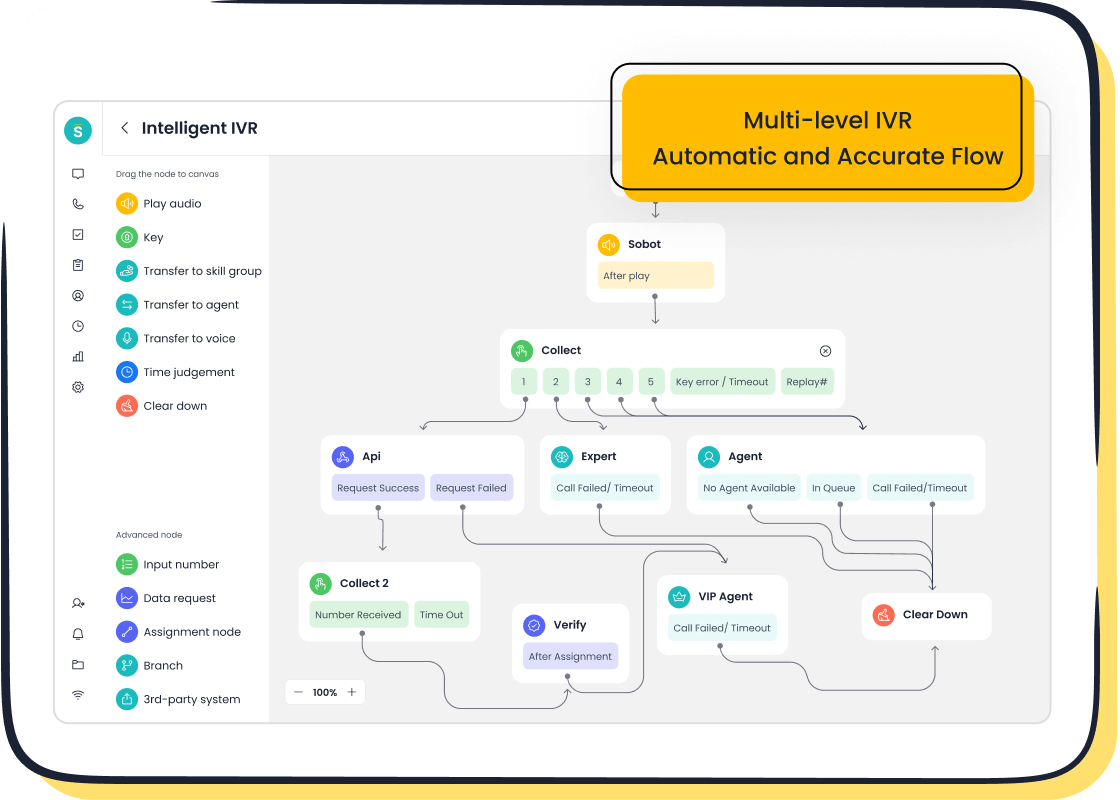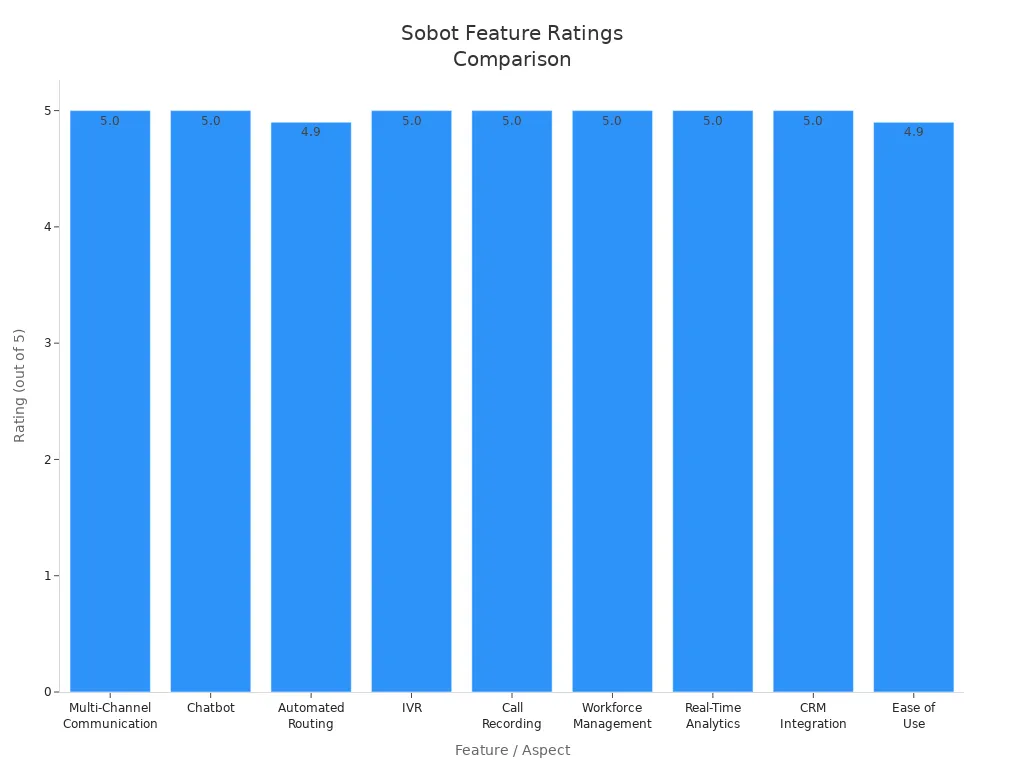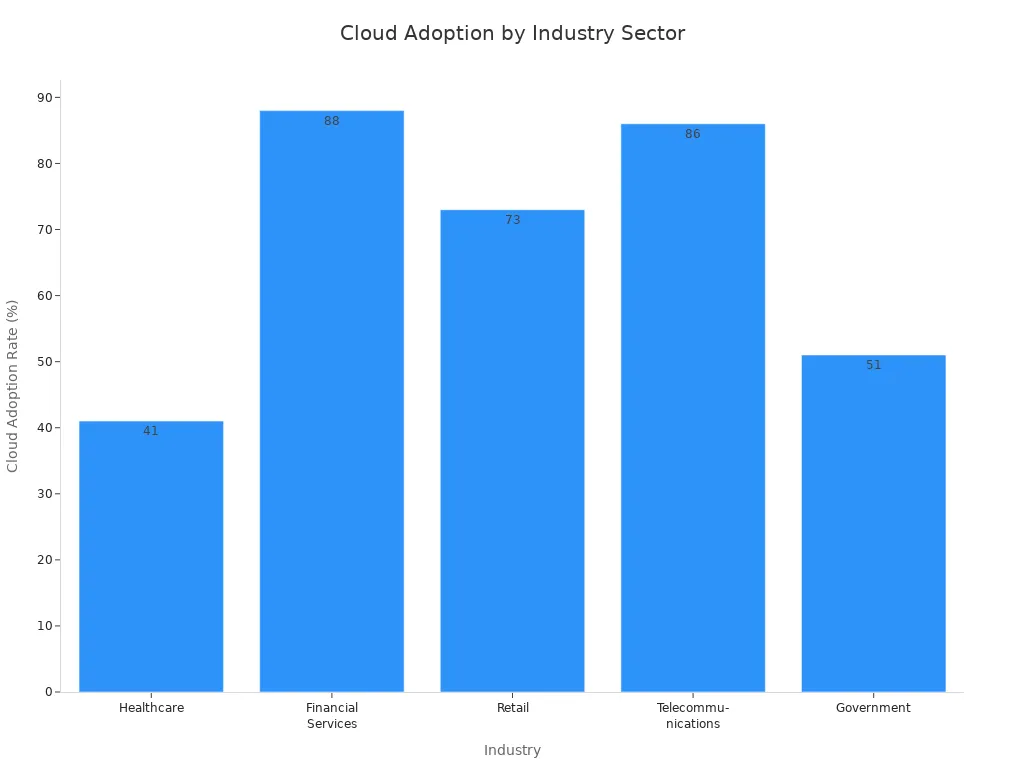How Contact on Cloud Transforms Customer Service

Contact on cloud is reshaping customer service. You now see cloud contact center platforms like Sobot AI making it easy to manage every conversation in one place. With 71% of companies using omnichannel contact center software reporting big business gains, you can expect better customer experience and lower costs. Contact on cloud lets you support customers across chat, call, and social media without missing a beat. Sobot call center gives you a customer service solution that improves agent productivity and builds trust. Start using cloud contact center software to deliver seamless service and grow your business.
Cloud Contact Center Basics

What Is a Cloud Contact Center
You may wonder what a cloud contact center is and why so many businesses now rely on it. A cloud contact center is an internet-hosted service that manages all your inbound and outbound customer communications. You do not need to install or maintain any physical hardware on your premises. Instead, you access the contact center software through the internet, and a third-party provider manages the system for you.
Here are some key features that define a cloud contact center:
- Advanced contact routing sends customer inquiries to the right agent, no matter which channel the customer uses.
- Real-time and historical reporting helps you monitor and improve your operations.
- Integrated voice response (IVR) lets you route calls, send messages, and offer self-service options.
- Workforce optimization tools help you manage agent schedules, monitor quality, and even use gamification to boost performance.
- Speech analytics allow you to analyze voice interactions and spot trends or issues.
- Omnichannel support means you can handle voice calls, emails, chats, and social media messages in one unified workspace.
You can see how a cloud contact center platform gives you flexibility and scalability. You can add new features or channels as your business grows. You also get a better customer experience because your team can respond quickly and consistently across every channel.
Tip: If you want to learn more about how cloud contact centers are changing customer service, check out this industry overview from Gartner.
How It Works
A cloud-based contact center uses cloud infrastructure to deliver all its services. You connect to the contact center software using a web browser or a mobile app. The provider hosts the platform on secure servers, often spread across multiple locations for reliability.
The core components of a cloud contact center include:
- Communication Platform: This is the central hub that manages all customer interactions. You can handle calls, chats, emails, and social media messages from one place.
- Customer Relationship Management (CRM): This system organizes customer data and tracks every interaction. You can see a customer’s history and provide more personalized service.
- Learning Management System (LMS): This tool helps you train your agents and keep their knowledge up to date.
- Workforce Management (WFM): This module forecasts call volumes, schedules agents, and helps you manage your team efficiently.
- Quality Management (QM): This system monitors service quality and provides feedback to agents.
- Business Analytics: This feature gives you insights into your operations. You can track metrics like average response time, customer satisfaction, and agent performance.
Cloud contact center software lets you scale up or down quickly. If you need more agents during a busy season, you can add them with just a few clicks. You do not need to buy new hardware or wait for weeks to set up new workstations. The provider handles all updates, maintenance, and security. You always have access to the latest features and improvements.
Cloud-based solutions also support remote work. Your agents can log in from anywhere with an internet connection. This flexibility helps you build a distributed team and offer 24/7 support if needed.
Note: Cloud contact center platforms often guarantee high uptime, sometimes as much as 99.99%. This means your customer service stays available even during unexpected events.
Key Differences from Traditional Systems
You might ask how a cloud contact center compares to a traditional on-premises system. The differences are significant and can impact your business in many ways.
| Aspect | Cloud Contact Center | On-Premises Contact Center |
|---|---|---|
| Deployment | Hosted on cloud servers, accessed via internet | Requires physical hardware and software installed on-site |
| Infrastructure Ownership | Owned and maintained by third-party provider | Owned and maintained by the company |
| Scalability | Highly scalable, can quickly adjust capacity | Limited scalability, requires physical upgrades |
| Implementation Time | Rapid setup, often within days | Longer deployment, can take months |
| Upfront Costs | Low upfront costs, subscription-based pricing | High upfront investment in hardware and software |
| Maintenance | Provider handles maintenance and updates | Internal IT responsible for maintenance and upgrades |
| Integration | Easier integration with cloud services and APIs | Integration can be complex, often vendor-dependent |
| Flexibility | Supports remote work, multichannel communication | Less flexible, typically supports fewer channels |
| Reliability & Resilience | Global redundancy, disaster recovery capabilities | Vulnerable to local hardware failures, limited redundancy |
| Innovation Adoption | Regular updates, supports AI and automation features | Slower to adopt new technologies due to hardware constraints |
A cloud contact center gives you the ability to deploy your system in days, not months. You do not need to invest in expensive hardware or hire a large IT team. The provider manages everything, from updates to disaster recovery. You can scale your operations up or down as needed, which is much harder with traditional systems.
Cloud-based contact centers also support omnichannel communication. You can interact with customers through voice, chat, email, and social media, all from one contact center platform. Traditional systems often limit you to phone calls and require separate tools for other channels.
Operationally, a cloud call center lets your agents work from anywhere. You can build a global team and offer support around the clock. Traditional contact centers require agents to work on-site, which limits your flexibility and increases costs.
Here are some key operational differences:
- Cloud contact centers use a subscription model, so you pay predictable monthly fees. Traditional systems require large upfront investments and ongoing maintenance costs.
- Cloud call centers offer rapid, flexible scaling. You can add or remove agents as your needs change. On-premises systems require hardware upgrades and long lead times.
- Cloud contact center software supports advanced features like AI, analytics, and automation. These tools are harder to implement in traditional setups.
- Cloud infrastructure provides built-in disaster recovery and global redundancy. Your service stays online even if one server fails.
Did you know? According to industry experts, cloud-based contact centers can reduce operational costs by up to 30% and improve customer satisfaction scores by supporting faster response times and better service quality.
Cloud solutions also make it easier to integrate with other business tools. You can connect your contact center software to your CRM, marketing automation, or e-commerce platforms. This integration helps you deliver a seamless customer experience and gather valuable data for business decisions.
Contact on Cloud Features
Omnichannel Support
You want your customers to reach you on any channel they prefer. Modern contact center software gives you omnichannel support, letting you handle voice, chat, email, and social media in one place. Sobot’s Omnichannel Solution stands out by unifying all customer interactions, so you never lose track of a conversation. You can use omnichannel routing to direct each inquiry to the right agent, improving response times and customer experience.
Here are some common features you get with cloud contact center solutions:
- Scalability for high inquiry volumes across locations.
- Real-time analytics and performance analytics for every channel.
- Unified agent workspace for phone, chat, email, and social media.
- Automated workflows and ticketing to boost efficiency.
- Self-service options like AI-powered chatbots and knowledge bases.
- Robust integrations with CRM and business tools.
| Feature Category | Description |
|---|---|
| Integrated Communication | Support across voice, chat, text, social media, and more, allowing customers to use preferred channels. |
| Self-Service Options | Interactive Voice Response (IVR) and AI-powered chatbots enabling customer self-help. |
| Omnichannel Routing | Directs inquiries to the most suitable agent based on expertise and availability. |
| CRM and Third-Party Integration | Integration with CRM systems and other business tools for unified customer data. |
AI and Automation

AI contact center technology changes how you serve your customers. Sobot’s Voice/Call Center uses AI-powered voicebots and intelligent call routing to handle routine tasks and direct calls to the best agent. AI-driven automation lets you focus on complex issues while chatbots provide 24/7 self-service options. Real-time agent assistance, sentiment analysis, and automated case summaries help you resolve issues faster and improve customer experience.
- AI agents handle routine inquiries, reducing wait times.
- Intelligent routing matches customers to the right agent.
- Real-time analytics and insights optimize workflows.
- AI-powered self-service options empower customers to solve problems on their own.
Sobot’s AI contact center features help you increase productivity and reduce costs. You get a cloud call center that adapts as your business grows.
Unified Workspace
A unified workspace brings all your customer communications together. Sobot’s cloud call center platform gives agents a single dashboard for calls, chats, emails, and social media. Integrations with CRM systems let you see full customer profiles and history, making every interaction personal and efficient. You can switch between channels without losing context, thanks to seamless cloud solutions.
- Centralized workspace reduces agent effort and training time.
- Advanced call routing and AI tools speed up resolutions.
- Built-in analytics and security features protect your data.
- Flexible access supports remote and hybrid teams.

Sobot’s cloud contact center solutions offer global reach, high uptime, and easy scaling. You can trust these tools to deliver a better customer experience and streamline your operations.
Contact Center Software Benefits
Scalability and Flexibility
You need a contact center that grows with your business. Cloud contact center platforms give you unmatched scalability and flexibility. You can add or remove agents in minutes. You do not need to buy new hardware or wait for IT support. Cloud providers handle all infrastructure updates and maintenance. This means you can focus on your customers and adapt quickly to changes.
- On-premise systems require ongoing IT management for servers and troubleshooting.
- Cloud contact center software lets you scale up or down without extra costs or delays.
- You get automatic updates and built-in security, so your business stays agile.
Cloud contact centers eliminate costly hardware and simplify maintenance. You can respond to customer needs faster and stay ahead of the competition.
Cost Efficiency
Cloud contact center software helps you save money in many ways. You do not need to invest in expensive servers or pay for large IT teams. Maintenance costs drop by about 7% when you move from on-premises to cloud solutions. You also avoid the high costs of server rooms and utility bills.
- Companies like Capital One cut infrastructure costs by 45% after switching to cloud call center platforms.
- Intuit reduced operational costs by 40% and improved scalability for busy seasons.
- Siemens lowered its total cost of ownership by 30% and enabled global remote work.
Cloud contact center software offers a subscription model, so you pay only for what you use. You get free upgrades and fewer equipment expenses. Remote work options also reduce office space costs.
Remote Work Support
Cloud contact center software supports remote and hybrid work models. As of 2023, 72% of US contact centers operate remotely or in a hybrid setup. Cloud call center platforms let agents access tools securely from anywhere. This flexibility helps you hire talent from around the world and keep your business running during disruptions.
- Real-time analytics and workforce management tools help supervisors monitor performance.
- Advanced security features, like multi-factor authentication and VPNs, protect your data.
- Hybrid models improve agent satisfaction and lower operational costs.
By 2025, over 65% of global contact centers will use hybrid models. Cloud solutions make this possible by ensuring seamless communication and data access.
Security and Reliability
You want your customer data to stay safe and your service to stay online. Cloud contact center software offers strong data security with encrypted data transfer and secure access controls. Sobot delivers 99.99% uptime, so your contact center stays available even during peak times. With a global network and 110 points of presence, Sobot ensures reliable connections for your team and customers.
- Secure data transfer protects sensitive information.
- High uptime means fewer service interruptions.
- Global reach supports customers in any location.
Cloud call center platforms give you peace of mind with built-in disaster recovery and compliance features. You can trust your contact center software to keep your business running smoothly.
Tip: Real-time analytics, AI-powered assistance, and workforce management tools in cloud contact centers help agents resolve issues faster and improve customer satisfaction. For example, DMV contact centers saw a 20% decrease in call handling time and a 30% reduction in wait times after adopting cloud solutions.
| Metric | Improvement |
|---|---|
| Time to Resolution | 36% faster |
| Customer Satisfaction | 21% higher |
| Agent Productivity | Increased |
Cloud contact center software transforms your customer support by making your team more productive and your customers happier.
Customer Experience Transformation
Personalization
You want every customer interaction to feel unique. Cloud contact centers use AI-driven personalization to tailor support for each customer. You see features like chatbots, predictive analytics, and real-time recommendations. These tools help agents understand customer needs and respond with relevant solutions. Pop-up screens show customer history and current support tickets, making personalized customer interactions possible. Omnichannel integration lets you connect with customers on voice, SMS, email, and social platforms. When you use a customer experience platform like Sobot, you gain advanced reporting and insights to refine your personalization strategies.
- AI-powered chatbots answer questions based on customer profiles.
- Predictive analytics suggest solutions before customers ask.
- CRM integration keeps all customer data in one place.
Personalized support increases customer engagement rates, satisfaction scores, and retention. Customers expect fast, convenient, and knowledgeable service. When you deliver this, you build loyalty and long-term relationships.
Faster Resolution
You want quick answers when you reach out for help. Cloud contact centers enable faster resolution by unifying all communication channels. You can switch from chat to call without repeating information. Agents see your full profile, including purchase history and past support cases. Intelligent IVR self-service lets you solve simple problems on your own, even outside business hours. Effective routing matches you with the best agent for your issue, reducing handle time and increasing first-contact resolution.
- IVR self-service avoids long wait times.
- 24/7 support means help is always available.
- Data collection gives agents the information they need upfront.
Sobot’s partnership with Opay shows the impact of these features. After implementing Sobot’s omnichannel solution, Opay increased customer satisfaction from 60% to 90%, reduced costs by 20%, and boosted conversion rates by 17%. You can read more about Opay’s results here.
Tip: Faster resolution leads to happier customers and lower operational costs.
Consistency Across Channels
You expect the same quality of service whether you contact support by phone, email, or chat. Cloud contact centers use omnichannel solutions to integrate all communication channels into a unified platform. Intelligent routing directs your inquiry to the most qualified agent. Real-time synchronization keeps conversation history and messages together, so agents never lose context. CRM integration updates customer profiles automatically, ensuring agents have instant access to relevant data.
| Metric | Outcome |
|---|---|
| CSAT | Higher scores |
| First Contact Resolution | Improved rates |
| Average Handling Time | Reduced |
| Conversion Rate | Increased |
Sobot’s cloud contact center provides consistent support for remote agents, ensuring you get reliable service every time. Real-time dashboards track key metrics like customer satisfaction, agent productivity, and channel utilization. These features help you maintain high standards and deliver a seamless customer experience.
Real-World Use Cases

Industry Applications
You see cloud contact center solutions transforming many industries. Retailers use cloud contact center platforms to manage high volumes of customer inquiries, especially during sales events. Financial services rely on cloud contact center technology for secure, compliant customer engagement. Healthcare organizations use cloud contact center systems to handle patient questions and appointment scheduling. Telecommunications companies support millions of users with cloud contact center tools. Government agencies improve public service delivery with cloud contact center adoption.
| Industry | Cloud Adoption Rate | Relevance to Cloud Contact Centers |
|---|---|---|
| Healthcare | 41% YoY increase | High customer interaction and compliance needs |
| Financial Services | 88% cloud usage | Compliance-driven, extensive customer engagement |
| Retail | 73% cloud adoption | E-commerce growth, customer service focus |
| Telecommunications | 86% cloud usage | Core services in cloud, customer support intensive |
| Government | 51% adoption | Regulatory compliance, public service customer contact |

Success Stories
You can find many examples of businesses improving service with cloud contact center platforms. AJE, a beverage company, reduced wait times by 60% and improved first-call resolution by 40% after switching to a cloud contact center. Emssanar, in healthcare, cut operational costs by 45% and increased first-call resolution by 35%. Florida Technical College used a cloud contact center to reduce response times by 40% and boost applicant conversion by 30%.
- Healthcare payers lowered call transfer rates by 27.5% using cloud contact center systems.
- Member contact centers reduced average call handling time by up to 75%.
- Agents found cloud contact center platforms easier to use, improving member outcomes.
- Companies scaled quickly and trained staff faster with cloud contact center solutions.
Overcoming Common Concerns
You may worry about security, reliability, or internet dependency when considering a cloud contact center. Providers use encryption to protect data in transit and at rest. Security teams monitor systems full-time, which improves protection compared to in-house setups. You can customize security settings for each user. Most businesses report better security and easier compliance after moving to a cloud contact center.
Hybrid cloud adoption is rising, especially with 5G technology. This allows you to store sensitive data privately while using public cloud scalability. 5G improves data transfer speeds and reliability, reducing latency and supporting real-time service in finance, retail, and gaming. Cloud contact center platforms offer strong SLAs, disaster recovery, and real-time monitoring to keep your operations running smoothly.
Tip: Careful planning, phased migration, and employee training help you transition to a cloud contact center with minimal disruption.
Contact on cloud helps you deliver better customer service and drive business growth. Sobot’s cloud contact center gives you 24/7 support, fast response times, and seamless omnichannel interactions. You can scale easily, save costs, and keep your data secure.
When you choose a contact center solution, look for these key factors:
- Match the platform to your business goals.
- Check for easy setup and strong analytics.
- Make sure it integrates with your CRM and supports remote work.
- Confirm security and compliance.
Explore Sobot’s AI-powered features and request a demo to see how contact on cloud can transform your customer service.
FAQ
What is a cloud contact center?
A cloud contact center is a customer service platform you access online. You do not need special hardware. You use it to manage calls, chats, emails, and social media from anywhere. This makes your support team flexible and ready for any situation.
How does cloud contact center software help my business?
Cloud contact center software lets you scale your team fast. You can add agents during busy times. You save money because you do not buy servers. You also get updates and security from your provider. This helps you focus on your customers.
Is a cloud call center secure?
Yes, a cloud call center uses strong encryption and security tools. Your data stays safe during transfer and storage. Providers like Sobot offer 99.99% uptime and global network support. You can trust your contact on cloud to protect customer information.
Can I use a cloud contact center platform for remote work?
You can use a cloud contact center platform from any location. Agents log in with a web browser or mobile app. This supports remote and hybrid teams. You keep your service running even if your office closes.
What channels can I manage with contact on cloud?
Contact on cloud lets you handle voice calls, live chat, email, and social media in one place. You switch between channels without losing information. This unified approach improves customer experience and agent productivity.
Tip: Cloud contact center software helps you deliver fast, reliable support across every channel your customers use.
See Also
Best Cloud Contact Center Services Reviewed For 2024
How AI Agents Are Transforming Customer Support Today
Discover Leading Cloud Contact Centers Coming In 2025
